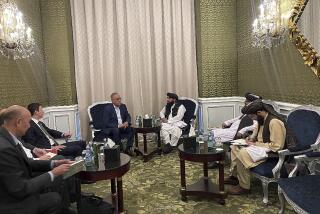Overture by Taliban Hits Resistance
- Share via
At the tender age of 24, Sayed Rahmatullah Hashemi has one of the tougher sells in the world: trying to launch a major charm offensive on behalf of the ruling Taliban party of Afghanistan.
At a Town Hall forum Thursday, Hashemi, the Taliban’s roving envoy, seemed to find very few buyers.
The Islamic regime is accused of harboring suspected terrorist Osama Bin Laden, stripping women of education, jobs and freedom and, most recently, blowing up priceless Buddhist statues in defiance of worldwide appeals. Despite Hashemi’s efforts to explain his regime’s policies, some audience members were unmoved.
“I just can’t begin to put into words how evil, how truly, truly horrific evil, the Taliban militia is,” Sarah Bradshaw of the Feminist Majority Foundation told him before a lunchtime crowd at the Beverly Hilton Hotel. “It’s as if we’ve invited Hitler here.’
Unruffled, Hashemi asked Bradshaw not to make assumptions, and claimed media reports of widespread oppression of women were false. He said women were initially barred from leaving their homes because of the chaos in the streets sparked by civil war, but now are studying, working and moving around town freely.
“Instead of criticizing, please come and help,” said Hashemi, who was appointed in 1999 as senior advisor to Taliban Supreme Leader Mullah Muhammad Omar.
The Town Hall forum was Hashemi’s final meeting in a weeklong visit to California, where he spoke at several universities, including USC, UCLA and UC Berkeley. Later Thursday, he left for New York for another stop on his public relations tour before going to Washington, where he is scheduled to deliver a letter from his party to the Bush administration.
Hashemi said the regime was eager to seek an end to United Nations sanctions, imposed in 1999, and to resolve the deadlock over Bin Laden. But he blamed U.S. demonization of Bin Laden and the retaliatory missile attacks on Afghanistan in 1998 for making the Saudi a folk hero in the Islamic world and therefore politically difficult to simply hand over.
The slim Afghan, dressed in a turban and double-breasted gray jacket over traditional Afghan wear, fled Afghanistan’s civil war as a boy and returned in 1995 to join the Taliban. Fluent in five languages, including English, Hashemi said the Taliban decided to launch the public relations campaign because of what he called grossly distorted news reporting about Afghanistan.
In fact, he said, the Taliban has managed to unify a country spent from two decades of war and fractured into five warring Islamic factions. He said the regime has managed to remove the greatest public safety threat--widespread ownership of weapons--by disarming 95% of the country. And, he said, the Taliban has eradicated most of Afghanistan’s opium production, which used to provide 75% of the world’s supply. But such accomplishments are never mentioned by the world media, he complained.
Nor, Hashemi said, does anyone seem to care about the plight of the Afghan people. The severest drought in 30 years has led to widespread malnutrition. And the U.N. economic sanctions have further crippled the country. “Nobody has helped us,” Hashemi said. “They have only isolated [us] and tried to exorcise our government.”
As he has all week, Hashemi told the crowd that the Afghan people wanted the statues destroyed because international agencies were spending money to repair them, but refusing to do anything to help dying Afghan children. Islam allows idols to be destroyed when they become harmful, he said in response to one question.
Reminded that Muslim scholars around the world had decried the destruction as violating Islamic tradition and law, Hashemi replied: “That is their own interpretation of Islam.”
Some audience members expressed confusion over the conflicting reports about Afghanistan. Salam Al-Marayati of the Muslim Public Affairs Council proposed that a Muslim fact-finding group visit the country to determine such issues as the true status of women.
One Afghan native interviewed by telephone Thursday backed Hashemi’s accounts. Maryam Lodin, an Afghan native and Los Angeles microbiologist, said she visited her native country last year and found vast improvement in women’s status, as the envoy claimed. In her first visit, in 1994, she said, she was barred from going out without a male escort, mainly because the lawless streets were too dangerous. But last year, she said, she spent three months in the country with the World Health Organization and found women working in hospitals, freely shopping and traveling alone, as she did herself.
Her own relatives and friends have started a school for girls in Khandhar in southern Afghanistan, and many others have followed suit, she said. In addition, she said, the Taliban has brought electricity and phones to the impoverished country.
“The Taliban has brought a lot of changes, I’d say for the better,” said Lodin, 25. “Yeah, I had to wear a burqa [the head-to-toe black garment], but it’s been that way for generations.”
Jehangir Malik of Islamic Relief in Burbank said in an interview that Hashemi’s dire accounts of starvation and death were not exaggerated. The relief organization has workers inside Afghanistan who say that 500 people a week are dying. The organization is planning a fund-raiser Saturday to raise money for Afghan refugees.
Some at Thursday’s Town Hall speech left as skeptical as they had arrived.
Gary Ratner of the American Jewish Congress said the Taliban should have sold the Buddhist statues if it was so concerned about money for children. And, if leaders are serious about solving the Bin Laden problem, they should give him up to an impartial tribunal led by respected Islamic jurists.
“They are trying to pull the wool over the world’s eye by trying to justify what they do at the expense of continuing the carnage, starvation and refugee problems,” Ratner said.
More to Read
Sign up for Essential California
The most important California stories and recommendations in your inbox every morning.
You may occasionally receive promotional content from the Los Angeles Times.














